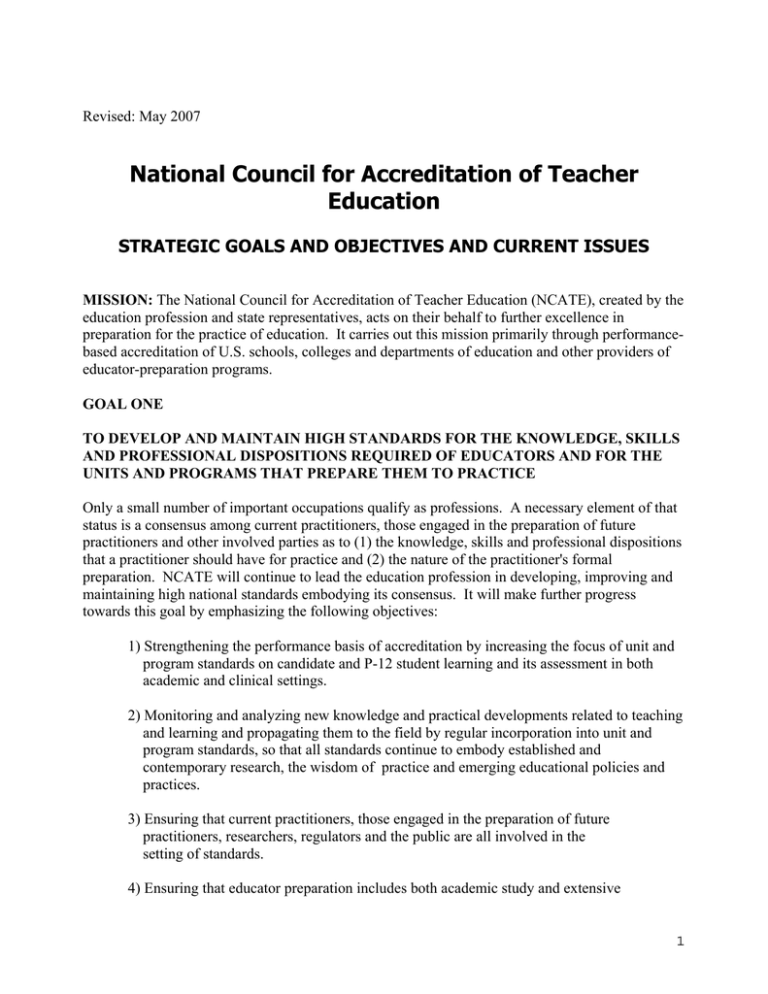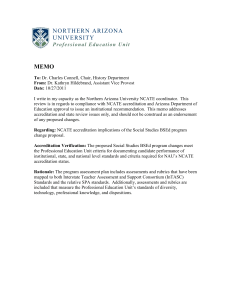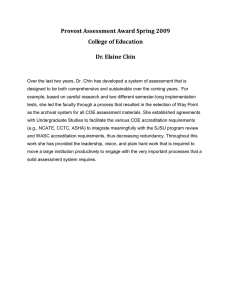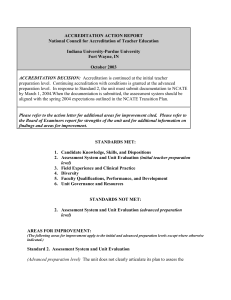National Council for Accreditation of Teacher Education
advertisement

Revised: May 2007 National Council for Accreditation of Teacher Education STRATEGIC GOALS AND OBJECTIVES AND CURRENT ISSUES MISSION: The National Council for Accreditation of Teacher Education (NCATE), created by the education profession and state representatives, acts on their behalf to further excellence in preparation for the practice of education. It carries out this mission primarily through performancebased accreditation of U.S. schools, colleges and departments of education and other providers of educator-preparation programs. GOAL ONE TO DEVELOP AND MAINTAIN HIGH STANDARDS FOR THE KNOWLEDGE, SKILLS AND PROFESSIONAL DISPOSITIONS REQUIRED OF EDUCATORS AND FOR THE UNITS AND PROGRAMS THAT PREPARE THEM TO PRACTICE Only a small number of important occupations qualify as professions. A necessary element of that status is a consensus among current practitioners, those engaged in the preparation of future practitioners and other involved parties as to (1) the knowledge, skills and professional dispositions that a practitioner should have for practice and (2) the nature of the practitioner's formal preparation. NCATE will continue to lead the education profession in developing, improving and maintaining high national standards embodying its consensus. It will make further progress towards this goal by emphasizing the following objectives: 1) Strengthening the performance basis of accreditation by increasing the focus of unit and program standards on candidate and P-12 student learning and its assessment in both academic and clinical settings. 2) Monitoring and analyzing new knowledge and practical developments related to teaching and learning and propagating them to the field by regular incorporation into unit and program standards, so that all standards continue to embody established and contemporary research, the wisdom of practice and emerging educational policies and practices. 3) Ensuring that current practitioners, those engaged in the preparation of future practitioners, researchers, regulators and the public are all involved in the setting of standards. 4) Ensuring that educator preparation includes both academic study and extensive 1 supervised teaching experience. 5) Aligning and promoting compatibility among unit accreditation standards, Specialized Professional Association (SPA) standards, licensing standards, advanced certification standards and P-12 student standards. 6) Supporting efforts of SPAs to develop, improve and maintain program standards that are concise and complementary to unit standards. 7) Encouraging greater consistency in requirements across program standards and reviews. 8) Adapting unit and program standards to ensure high-quality educator preparation by units of providers other than colleges and universities. In accomplishing these objectives, the following current issues should be given particular attention: 1) Given the increasing emphasis on assessment in teaching and learning, NCATE should identify and include in its program and unit standards any necessary knowledge, skills and professional dispositions related to assessments both for the advancement of learning and for accountability, so that teachers are prepared to implement the particular assessments directed by their employers and regulators. 2) Given that classroom teaching experiences in most traditional education preparation are relatively limited, NCATE should seek to strengthen that aspect of educator preparation, in both traditional and new settings. 3) Given the accumulating body of educational research on effective teaching, NCATE’s key role in advancing the use of that body of knowledge in educator-preparation units and the current under-participation in NCATE of education faculty of leading research institutions, NCATE should find ways to include the research community more effectively in the development and improvement of its standards. 4) Given the growing body of content in many fields that is potentially appropriate for P-12 education and the consequent need for P-12 educators to exercise professional judgment in their own choice of curricula, NCATE should ensure that its program standards adequately distinguish between necessary and desirable content. 5) Given that pedagogical decisions are made at the local level, NCATE should ensure that in the absence of professional consensus its unit and program standards provide for candidates to be prepared for multiple pedagogies based on research and best practice. 6) Given the summative role of state licensing tests in educator preparation, NCATE should work to increase the alignment of its unit and program standards and state licensing tests at a high level of performance as well as in comprehensiveness. 2 GOAL TWO TO OPERATE AN EFFICIENT AND EFFECTIVE ACCREDITATION SYSTEM TO ASSESS THE QUALITY OF EDUCATOR-PREPARATION UNITS AND THEIR PROGRAMS A profession assesses the quality of preparation for its practice by an effective and efficient performance-based accreditation system applying the profession's standards. An effective accreditation system is one that provides high-quality assurance across preparatory units and programs in a consistent and fair way. An efficient system is one that assesses performance in a manner that is, for the units, the least intrusive and disruptive and, for both them and the accreditor, the most cost-effective. NCATE will make further progress towards this goal by emphasizing the following objectives: 1) Supporting efforts of SPAs to use performance data as the primary evidence to judge whether their standards are met. 2) Integrating the unit and program review components of accreditation. 3) Streamlining both the unit and program review processes by using technology before, during and after on-site visits, as well as in collecting and analyzing accreditation data and communicating with units and reviewers. 4) Ensuring that the processes for national program recognition by NCATE and its SPAs and program approval by the states reduce duplication of effort both by them and by educator-preparation units. 5) Continuing and making apparent its core values of non-partisanship, ideological neutrality, objectivity and fairness. In accomplishing these objectives, the following current issues should be given particular attention: 1) Given recent and prospective increases in the quantity and quality of performance data available, NCATE should explore additional possibilities for streamlining the accreditation process by reducing the amount of other information that it has traditionally collected from educator-preparation units. 2) Given that a primary goal of NCATE's state partnerships is to reduce duplication of effort, and under the partnerships states have the option to conduct program reviews themselves or delegate the reviews to NCATE, NCATE should ensure that states electing to conduct the reviews themselves have program standards closely aligned with those of the SPAs, and their review processes are sufficiently rigorous, particularly in requiring candidate-performance data satisfying NCATE's Unit Standard 1. 3) Given the need for peer review to reflect both the general insights of the education profession as a whole and the great diversity of educator-preparation units, NCATE 3 should ensure that its visiting teams of examiners include both a broad spectrum of professional educators and those with specific experience with like units. 4) Given the availability of NCATE’s current annual reporting system for accredited units and the increasing availability of performance-based data about them, NCATE should explore possible measures to simplify its requirements and processes for continuing accreditation. GOAL THREE TO OFFER ADVICE AND LIMITED TECHNICAL ASSISTANCE TO EDUCATORPREPARATION UNITS IN IMPROVING THEIR OWN QUALITY AND THE QUALITY OF THEIR COMPLETERS In many professions, the preparation-accreditation and representational/assistance functions are combined in a single organization. The advantage of splitting those two functions, as in the case of educator preparation, is to increase both the outside perception and the reality of objectivity in accreditation. The American Association of Colleges for Teacher Education (AACTE) accordingly has the responsibility to assist educator-preparation units in quality improvement. Nevertheless, NCATE has long had target levels of performance in its rubrics, and teams of examiners already visiting educator-preparation units to assess the adequacy of their implementation of unit and program standards may well have useful observations for the units with regard to their improvement. In certain special situations, moreover, it may also be appropriate for NCATE to offer limited technical assistance related to accreditation to educator-preparation units. It will make further progress towards this goal by emphasizing the following objectives: 1) Continuing its long-standing efforts to offer technical assistance to the educatorpreparation units of Historically Black Colleges and Universities and other institutions that prepare large numbers of members of groups underrepresented in the P-12 teacher force. 2) Identifying other special situations in which it might be appropriate for NCATE to offer advice and/or technical assistance to educator-preparation units. 3) Co-ordinating all special technical-assistance efforts with AACTE. In accomplishing these objectives, the following current issues should be given particular attention: 1) Given the potential for some educator-preparation units to maintain their reputations for high quality on their own, and the dedication of resources necessary for them to obtain accreditation, NCATE should ensure that it is responsive to requests from them to utilize the accreditation process in their own efforts at self-improvement. 2) Given that NCATE's movement to performance-based accreditation may have occurred more quickly than the traditional pace of change in many academic institutions, NCATE should offer technical assistance in high-quality assessment. 4 GOAL FOUR TO COMMUNICATE EFFECTIVELY WITH ALL INTERESTED PARTIES, INCLUDING THE PUBLIC, ABOUT ITS WORK AND TO CO-ORDINATE WITH OTHERS ALSO HAVING RESPONSIBILITY FOR THE IMPROVEMENT OF EDUCATOR PREPARATION AND OTHER ASPECTS OF EDUCATOR QUALITY An understanding by all interested parties, including the public, of the nature and importance of high-quality educators and of the positive value of high-quality performance-based professional accreditation to further their preparation is important to accomplish NCATE's mission. NCATE will continue to partner with the states and its other members to improve the preparation of P-12 educators and ensure that they have a positive effect on student learning. NCATE will make further progress towards this goal by emphasizing the following objectives: 1) Generally strengthening NCATE’s communications efforts to disseminate information about accreditation and high-quality educator preparation to the profession and to the public. 2) In particular, maintaining a strong voice to promote the units and programs accredited by it. 3) Conducting state relations through activities designed to assist states in improving quality assurance mechanisms for teacher preparation and licensing. 4) Monitoring federal activity related to the accreditation of teacher preparation and providing accreditation information as appropriate. 5) Supporting NCATE member organizations’ efforts at the federal, state, and local levels to improve the quality of teachers and other professional school personnel in P-12 schools. 6) Gaining support for accreditation and quality educator preparation from non-traditional constituencies, such as commercial organizations, testing companies and others. 7) Assisting member organizations in informing their own members about the benefits of accreditation. 8) Working with member organizations to inform college and university presidents, heads of education units and faculty about NCATE accreditation in order to encourage them to seek it. In accomplishing these objectives, the following current issues should be given particular attention: 1) Given that evidence of the effectiveness of the accreditation of educator-preparation has 5 been limited, and demand from the public for such evidence is rising, NCATE should consider the adequacy of the data collected by educator-preparation units and encourage additional collection and analysis of data by others to provide that evidence. 2) Given the increased public awareness of the uneven distribution of high quality teachers among socioeconomic groups of P-12 students, NCATE should supplement its accreditation efforts to ensure that all prospective educators are prepared to work with diverse student populations by encouraging more of them to work in challenging schools. 6


